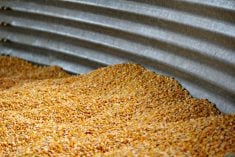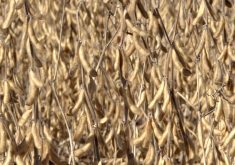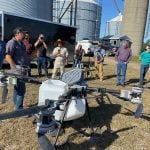A fatty acid compound, developed at Montreal’s McGill University to prod rhizobia bacteria into fixing more nitrogen in soils, is now zoned commercial.
Rhizobia inoculant and seed coating maker Becker Underwood on Wednesday announced a commercial licensing agreement with McGill that grants the Iowa company exclusive rights to the technology.
“We believe this technology will be an important tool in our efforts to develop and introduce new and modern inoculant products that deliver a greater return to the producers who use them,” Eda Reinot, Becker Underwood’s head of research and development, said in a release.
Read Also

Alberta Crop Report: Harvest reaches completion
Alberta’s harvest is virtually complete at 99.4 per cent finished, ahead of the five-year and 10-year averages at this time of the season.
The company said it expects its first products using McGill’s patented technology to be commercially available for spring seeding in 2010, with “additional new products utilizing the technology” expected in 2011 “and beyond.”
Legume crops such as soybeans, peas, lentils and alfalfa form symbiotic relationships with nitrogen-fixing rhizobia bacteria. This relationship begins with the plant naturally secreting certain compounds called flavonoids, which then spur rhizobia to produce and excrete the compounds needed to stimulate formation of nodules on the roots of the plant. The bacteria populate the nodule as it forms.
Inside the nodule, the bacteria are protected from environmental threats and receive nutrients that they need for survival from the plant. In return, Becker Underwood explained, the rhizobia capture N from the atmosphere and convert it into an N form a plant can use for growth and crop production.
The technology licensed to Becker Underwood involves a fatty acid compound shown to be “highly effective” in stimulating rhizobia to produce substances needed for increased nodule formation and nitrogen fixation.
“With this technology incorporated into the company’s high-performing rhizobial inoculant products, producers of soybean, peanut, pea, lentil and alfalfa crops are expected to realize improved crop yields,” the company said Wednesday.
“At a time when fossil fuel costs are likely to require the development of less energy-dependent inputs, it is key to be looking for bio-inputs to take the place of chemical ones,” said Donald Smith, chair of McGill’s plant science department and head of this project’s research team.
“The green tissues of plants are the place where almost all energy enters the biosphere. As a result, a plant growing in the field is not a singular and sterile entity; it is a community.
“Many of the associated micro-organisms have evolved over very long periods to live in association with plants,” Smith said. “In some cases, this has led to associations that, through various mechanisms, improve the ability of plants to grow.”















